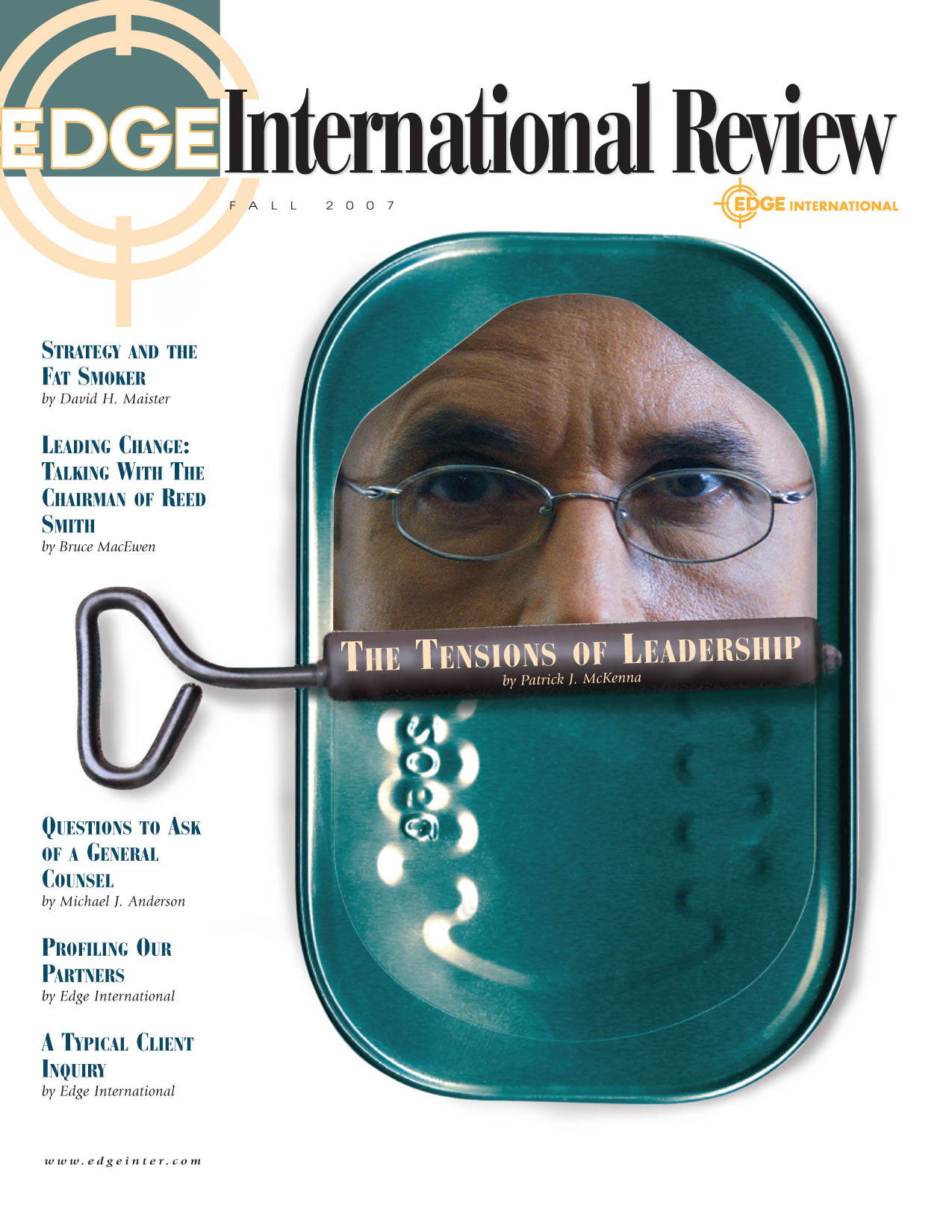
|
http://www.patrickmckenna.com/blog
Page << Prev 70 71 72 73 74 75 76 77 78 79 Next >> of 95
Post #252 - Tuesday, November 13, 2007
A Professorial Pose
So, what is this man thinking?
I received this today as part of an e-mail from the latest issue of AccountingWEB – a weekly business news wire. What a brilliant way to promote one’s blog!
With our Fall 2007 Issue of Edge International Review, I was especially pleased to include an article written by David and a very special offer concerning his forthcoming new book, Strategy And The Fat Smoker.
By the way, David's thinking that you had better not miss out on his special offer.
Post #251 - Sunday, November 11, 2007
Fall Issue of EIR Available
 The Fall 2007 Issue of Edge International Review arrived on the desks of some 2000 managing partners this week while I was traveling on client assignments somewhere between Washington DC and Portland Maine. The Fall 2007 Issue of Edge International Review arrived on the desks of some 2000 managing partners this week while I was traveling on client assignments somewhere between Washington DC and Portland Maine.
And already from Ray Werner, Chairman of Arnstein & Lehr in Chicago came this e-mail message early this morning . . .
This issue of the Review is perhaps the best ever, and it is usually high on my reading list because of the valuable articles that are included. Keep it coming. Thanks.
I believe that Ray is right, in that this issue is likely the best ever! Thank you Ray for your gracious feedback.
Post #250 - Saturday, November 3, 2007
Changes on the International Stage
For the past few years I’ve been surveying managing partners to determine their ‘burning issues.’ Last year we wondered aloud how worried U.S. capital market lawyers might be about one particular international trend, more than one law firm leader expressed concern over, “the recent drain of international public offerings flowing from New York to London.” We were told that, where New York once had 59 percent of global IPOs raising more than $1bn (in 2001), it now had a mere 6.5 percent. Behind the scenes, we suspected that there were a number of law firms quietly wondering if London could ever possibly displace New York as the world’s financial center – at least in the most lucrative, high-margin practices. When I proposed to American Lawyer that they might want to publish this article on management’s burning issues, they were eager until they read about this particular trend. When they asked me to make some editorial adjustments, we decided that this article might not fit into their New York-centric publication. year we wondered aloud how worried U.S. capital market lawyers might be about one particular international trend, more than one law firm leader expressed concern over, “the recent drain of international public offerings flowing from New York to London.” We were told that, where New York once had 59 percent of global IPOs raising more than $1bn (in 2001), it now had a mere 6.5 percent. Behind the scenes, we suspected that there were a number of law firms quietly wondering if London could ever possibly displace New York as the world’s financial center – at least in the most lucrative, high-margin practices. When I proposed to American Lawyer that they might want to publish this article on management’s burning issues, they were eager until they read about this particular trend. When they asked me to make some editorial adjustments, we decided that this article might not fit into their New York-centric publication.
Fast forward one year and this past week I found myself spending a few days back in New York working with a Global 50 law firm client and participated in meetings involving partners from their UK and the U.S. offices. Discussions evidenced a real sense of confidence among the UK partners as to the state of the legal market in London. And while none of New York’s top lawyers are going to admit it in public, there is a distinct nervousness evident here. Adding to that nervousness is the fact that a few months back, if you asked what the effect of the sub-prime crisis would be, you’d have heard talk about how it was all contained and limited. Not so these past weeks.
Meanwhile New York’s M&A powerhouse Wachtell Lipton has quietly announced that they are exploring the opportunity of launching their first ever international office . . . in none other than (you guessed it) London. One source close to the firm said: "There are partners who are stepping up their commitments to spending time in London. There's a core group of three to four partners visiting regularly. The big change is that the firm is going to London regularly. It used to be only when clients needed it."
Stay tuned. The level of activity between New York and London is getting more interesting.
Post #249 - Friday, October 26, 2007
Are Lawyers Becoming Extinct?
 My old friend Richard Susskind, Emeritus Professor of Law at Gresham College, IT adviser to the Lord Chief Justice and a British-based consultant to leading law firms is posing an intriguing question . . . Will lawyers exist in 100 years? My old friend Richard Susskind, Emeritus Professor of Law at Gresham College, IT adviser to the Lord Chief Justice and a British-based consultant to leading law firms is posing an intriguing question . . . Will lawyers exist in 100 years?
In his new book, The End Of Lawyers (to be published by Oxford University Press) Richard argues that lawyers in their present shape face extinction – or at least are “on the brink of a fundamental transformation.”
The driving force towards the end of lawyers as we know them is twofold: information technology and what Richard calls the market pull towards commoditization – carving up a lawyer’s job into identifiable and discreet pieces that can be outsourced and done more cheaply by others. As a result, the jobs of many traditional lawyers will be substantially eroded and often eliminated.
The book, a sequel to his very notable, The Future of Law (1996), is aimed at stimulating debate.

Susskind says: “The challenge I lay down is for lawyers to ask themselves, with hands on hearts, what elements of their workload could be undertaken differently – more quickly, cheaply, efficiently or to a higher quality – using different methods of working.” In other words, what are the core indispensable legal skills lawyers have and what can be replaced by less costly workers supported by technology or by lay people armed with online self-help tools?
A GREAT question Richard!!!
The market, Richard argues, is increasingly unlikely to tolerate expensive lawyers doing jobs (guiding, advising, drafting, researching, problem-solving and more) that can be done better by “smart systems and processes”.
Be on the lookout for this book in the new year. In the interim, here's a brief extract.
Post #248 - Friday, October 26, 2007
Making A Splash
As we engage with firms in helping them develop their strategic plans we are always diligent in looking for new and emerging areas of revenue potential. One of the areas we identified in a recent discussion with one of our clients . . .
 When you live in a country like the U.S. or Canada, you usually don't think about running out of water. You go about your life, taking regular showers, using your dishwasher, and drinking the recommended six to eight glasses of water a day. You never think about water being a luxury. When you live in a country like the U.S. or Canada, you usually don't think about running out of water. You go about your life, taking regular showers, using your dishwasher, and drinking the recommended six to eight glasses of water a day. You never think about water being a luxury.
But the truth is that water is a rare resource in many parts of the world. Experts are now saying that the need for water will double by the year 2050. The statistics surrounding water are a bit frightening - For example:
• Although our world is covered by a lot of water, approx 70%, only 3% of this is fresh water._
• 50 of the larges cities in China have a serious problem getting fresh water to their citizens._
• Mexico City brings fresh water into town from a distance of over 100 miles._
• Roughly one sixth of the world's population (or 1.1 billion people) do not have access to safe water, according to Water Aid.
Worldwide, the water industry has an estimated turnover of approximately US$340 - 370 billion each year. And as the demand for water picks up over the next few years (as emerging markets develop), and supply remains constant, water could face severe shortages.
You might think that the U.S. and Europe have an ample supply of water. That's true for the time being, but you should be aware that the systems that are being used are very old. Last year, it was reported that London wastes 300 Olympic swimming pools' worth of water every single day, just from leaks from ageing water mains. This means developed nations will need to make large investments in the future to restructure these old water infrastructures.
In the U.S., you will likely see significant new laws and regulations coming in before 2011 regarding water. Right now, regulations include the Surface Water Treatment Rule, Disinfection Byproduct Rule and Ground Water Disinfection Rule to name but a few.
BOTTOM LINE: I predict that this is going to be one of the red hot practice areas for professional service firms in the coming years.
Post #247 - Tuesday, October 23, 2007
All Hat, No Cattle
An interesting piece in today’s Wall Street Journal. Apparently the lack of distinctiveness surrounding an M.B.A. degree, has contributed to many reporting that they regard it as highly pretentious to witness some professional put ‘M.B.A.’ (or any such common designation) on their business card.
According to the Director of one of New York’s leading executive search firms, “When we see it (on a business card) it signals to us that the person might not be running around in highly professional circles.” And from a spokesperson at the University of Chicago’s Graduate School of Business, “The business skills attained via an M.B.A. should be evident in one’s work or conversations.” Well I suppose they should be, but are they really?
 Combine the pretentiousness of flaunting one’s credentials with the pretentiousness of one who waxes esoterically about his or her particular field of (supposed) expertise. You’ve seen them at work: they write lengthy articles purporting to offer new ways of thinking. When you try to decipher the practical aspects of what’s been written and try to discern what to actually do tomorrow, you realize you’ve got nothing more than someone proposing theoretical new “paradigms” (and don’t you just want to puke, every time you have to endure seeing them use that word?). These people glow in their ability to espouse academic theories, assemble arcane models, construct grandiose diagrams, and even attempt to compose new words and phrases to consecrate what they hope will be their pseudo-intellectual legacy. Combine the pretentiousness of flaunting one’s credentials with the pretentiousness of one who waxes esoterically about his or her particular field of (supposed) expertise. You’ve seen them at work: they write lengthy articles purporting to offer new ways of thinking. When you try to decipher the practical aspects of what’s been written and try to discern what to actually do tomorrow, you realize you’ve got nothing more than someone proposing theoretical new “paradigms” (and don’t you just want to puke, every time you have to endure seeing them use that word?). These people glow in their ability to espouse academic theories, assemble arcane models, construct grandiose diagrams, and even attempt to compose new words and phrases to consecrate what they hope will be their pseudo-intellectual legacy.
To complete our little recipe, gently mix the M.B.A. with the self-professed expert in abstract esoterica, and then fold-in a consultant’s business card, and you now have a real work in progress.
So, how does one discern the right ingredients – separate the spurious from the genuine? Well, my good Doctor Watson, the same way it has always been done.
Whether it is a matter of high-level strategy, management, or marketing, . . .simply ask that theory-spouting, MBA-toting consultant to give you a couple of significant client references for whom they have hands-on, personal experience in exorcizing the demons with their hocus-pocus, and you now have what I’ve come to call “all hat and no cattle!”
Post #246 - Tuesday, October 23, 2007
Thanks David.
A tip of the hat to my good friend and co-author David Maister for his kind acknowledgement yesterday of the material on this blog. David did The Blawg Review and designated a collection of posts on blogs relating to the business of law
I appreciate it . . . especially as I never really set this up as (what is now seen to be) a traditional blog, am now coming up on my sixth year of posting to this site, and am thankful for the many hundreds of visitors that stop by each day.
Post #245 - Friday, October 19, 2007
Examine Your Impact
Think about someone whom you consider to be a good leader. What is it about this person that has earned them your respect? In communications this week with Gregg Thompson of Bluepoint Leadership Development on this subject, Gregg says: them your respect? In communications this week with Gregg Thompson of Bluepoint Leadership Development on this subject, Gregg says:
I suggest that leadership has only one real measurement . . . the organizational outcomes it produces. In other words, how do others behave differently because of your leadership? Do they work harder; do they work on the right things; do they learn and grow; do they also lead?
We should take our eyes off the leader and instead look at the impact they have on their firm. The following questions are particularly useful for assessing any firm leaders impact on organizational outcomes:
• Are all the arrows (partners) going in the same direction? (alignment)
• Does everyone (partners and staff) bring their best talents and efforts to their client work, every day? (engagement)
• Are people committed to stay, through good times and bad? (retention)
• Is there a constant supply of ideas, change and improvement? (innovation)
• Does important work get completed with no one person taking credit? (collaboration)
• Is the firm known for exceptional expertise and development? (talent)
• Are professionals 2-3 times as effective as those in competing firms? (productivity)
• Do people thrive on change? (agility)
• Does the firm live ahead of the curve? (responsiveness)
• Is there extraordinary leadership throughout the firm? (pervasive leadership)
Post #244 - Friday, October 19, 2007
Your Cell Phone May Be Bugged
Bluetooth is a short-range communications standard that replaces the cables that would normally connect your laptops, cell phones, etc.
 Just about everyone seems to have a Bluetooth device these days. When they first became popular, I would see people walking down the street and apparently talking to themselves. At the time, I thought I was witnessing an outbreak of mental illness. Then, I noticed the small blue device hooked to their ear. This is a Bluetooth device - one of the hundreds on the market. Just about everyone seems to have a Bluetooth device these days. When they first became popular, I would see people walking down the street and apparently talking to themselves. At the time, I thought I was witnessing an outbreak of mental illness. Then, I noticed the small blue device hooked to their ear. This is a Bluetooth device - one of the hundreds on the market.
Because Bluetooth has been so successful, hackers have naturally tried to get around its security protocols. Bluetooth has had some spectacular security failures in its short lifetime. Now, researchers have discovered a new weakness. When your Bluetooth device is activated, an eavesdropper may be able to listen to your conversations - but only when you're NOT using the phone. Hackers just need a modified radio scanner to listen in on your conversations. Someone can simply drive down the street with such a scanner. When it detects a conversation broadcast by a Bluetooth device, that eavesdropper can listen to whatever you're saying. Essentially, the Bluetooth device acts as a microphone and transmitter, picking up whatever you say and broadcasting to anyone with the equipment to monitor it.
It's not clear how far away the scanner can be from the Bluetooth device to monitor conversations on it. So, to protect yourself. Don't use a Bluetooth device any more powerful than you really need. Small over-the-ear wireless devices have very low power and are difficult to monitor. But beware of larger units that connect to your vehicle's cigarette lighter or are dashboard-mounted. If you're in the market for a Bluetooth device, look for one that requires you to press a button or otherwise manually synchronize the device before it's used. Also, look for one that requires a PIN code and that allows you to change the PIN.
Post #243 - Friday, October 12, 2007
One Managing Partner Or Two?
 I've been engaged to look at whether a particular firm should have one managing partner (serving full time) or two lawyers splitting the role (and each serving half-time). I've been engaged to look at whether a particular firm should have one managing partner (serving full time) or two lawyers splitting the role (and each serving half-time).
Some may put forward the argument that having two firm leaders allows each of them to maintain a bit of a professional practice, but the ultimate decision isn’t so simple. Sometimes it makes sense and sometimes, far from being a cure-all, separating the roles can hinder your firm. It can result in two strong personalities constantly at loggerheads. And while they quietly squabble, important strategic decisions are subsequently delayed. Key variables revolve around whether your firm is in a growth mode, what new skill sets may be needed at this point in time, as well as the ages and retirement prospects for those possible leadership candidates being considered.
There are some critical factors and issues that should be considered. Among them:
• Do underlying business issues favor one firm leader or two?
- How could splitting the role potentially impact the firm in a negative way?
- Alternatively, if a lot of travel is involved integrating the various offices of the firm, would having two leaders make it easier to do the job?
• Is the firm trying to recover from major governance problem (perhaps a benevolent dictator / name partner who retired after a long term of leading the firm)?
• What would two firm leaders, bringing different skills and aptitudes to the job, have as a benefit to the firm?
• Would one of the firm leaders be focused largely on details, while the other be expected to think more about longer-term strategies?
• Would one have a more dominant personality?
- Would having two individuals, with strong personalities trying to collaborate with each other, actually harm the firm in any way?
• Could differing ages of possible leaders set up one for succession?
What do you think?
Page << Prev 70 71 72 73 74 75 76 77 78 79 Next >> of 95
|
|


 Ashridge House
Ashridge House  11226 - 60 Street
11226 - 60 Street  Edmonton, Canada
Edmonton, Canada  T5W 3Y8
T5W 3Y8